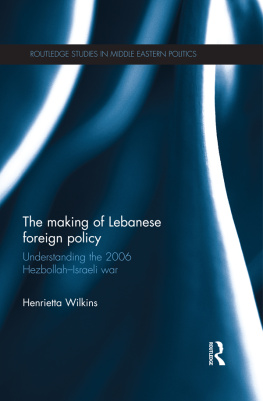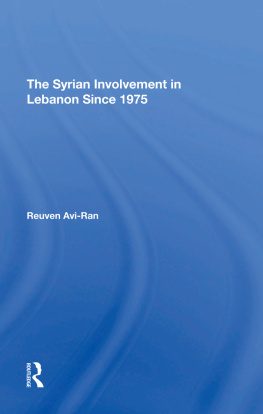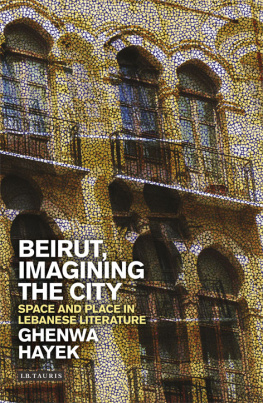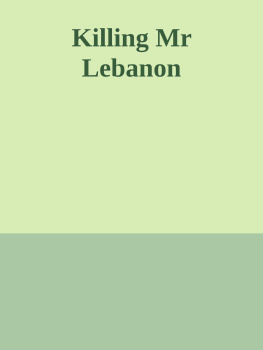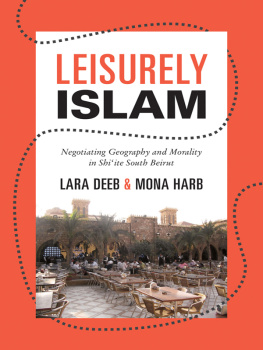Zahera Harb is a Lebanese journalist and academic. She teaches media studies for the Department of Culture, Film and Media at Nottingham University. She has more than ten years experience as a journalist in Lebanon, working for Lebanese and international media organisations. She started as a news reporter and distinguished herself in the coverage of war operations in the battlefield in south Lebanon. She is a member of the consultancy team of Thomson Foundation, UK, conducting media training for Arab journalists in and outside the Arab World. She is also a review editor for Journal of Media Practice.
To the late Lebanese prime minister, Rafic Hariri.
Without his support, pursuing a PhD and telling this story would never have become reality
and
To my late tutor, Geoff Mungham.
Without his guidance, I would not have come to this new understanding of propaganda in my work as a journalist
CHANNELS OF RESISTANCE IN LEBANON
LIBERATION PROPAGANDA, HEZBOLLAH AND THE MEDIA
Zahera Harb
Published in 2011 by I.B.Tauris & Co Ltd
6 Salem Road, London W2 4BU
175 Fifth Avenue, New York NY 10010
www.ibtauris.com
Distributed in the United States and Canada
Exclusively by Palgrave Macmillan
175 Fifth Avenue, New York NY 10010
Copyright 2011 Zahera Harb
The right of Zahera Harb to be identified as the author of this work has been asserted by her in accordance with the Copyright, Designs and Patent Act 1988.
All rights reserved. Except for brief quotations in a review, this book, or any part thereof, may not be reproduced, stored in or introduced into a retrieval system, or transmitted, in any form or by any means, electronic, mechanical, photocopying, recording or otherwise, without the prior written permission of the publisher.
| ISBN: | 9781 84885 120 7 (hb)
9781 84885 121 4 (pb) |
A full CIP record for this book is available from the British Library
A full CIP record is available from the Library of Congress
Library of Congress Catalog Card Number: available
Index produced by Gerard M-F Hill of Much Better Text
Printed and bound in Great Britain by TJ International Ltd,
Padstow, Cornwall
C ONTENTS
ACKNOWLEDGEMENTS
I would like to express my appreciation and gratitude to Professor Terry Threadgold, without whose academic and personal support, advice and constructive comments I would not have produced this book. My sincere and warm thanks go to her. Equally, I am grateful to Dr Karin Wahl-Jorgensen, who tailored my work with her invaluable criticism, comments and suggestions.
I would like to thank Thor Ekevall and Gerard M.-F. Hill, who dedicated their time and energy to helping me with my work.
My appreciation and gratitude also go to Philippa Brewster of I.B.Tauris, Professor Nick Hewitt, Professor Roger Bromley, Professor Catherine Davis and Dean Allan Ford of Nottingham University for offering me personal and institutional support in getting this book published.
A big thank you goes to my family my mum Khadijah, my dad Yousef and my brothers Salam and Tarek who waited a long time for the birth of this work. The same goes to my friends and colleagues in the UK, back home and overseas: your love, encouragement and support were invaluable, though you are far too numerous to mention (it would take pages).
Finally, many thanks to all those who dedicated their time and effort to help me with my research and particularly to all Lebanese journalists: you are the heroes of my story. Thank you.
INTRODUCTION
On 18 April 1996, I was there.
Children, women and old people lay in dozens, beheaded and eviscerated. They thought that sheltering inside the United Nations headquarters in the village of Qana might save their lives from indiscriminate Israeli shelling over their villages, but it did not. One hundred and six innocent souls were crushed.
I remember how drastic and horrendous the scene was. I remember the villagers of Qana shouting at the camera, waving their hands in every direction, asking us to film and tell the world what the Israeli army had done to the innocents, to their loved ones. I remember standing among the scattered bodies of guiltless people paralysed by the horrors of what I was witnessing and the civil defence rescuers screaming at us to continue filming. I remember the UN soldier sitting in one corner and crying over a child he was playing football with before the Israeli bombs fell.
These strong memories have remained ever present in my mind, even today, years after the massacre took place. They are now part of a collective memory shared by most Lebanese citizens and journalists.
Israel occupied south Lebanon for over 22 years between 1978 and 2000. In April 1996, Israel launched a massive assault on Lebanon, aimed at uprooting the Lebanese resistance, mainly from Hezbollah (Party of God). The Israeli army caused massive destruction and committed massacres, killing and injuring hundreds of Lebanese civilians. For 16 days I was positioned in south Lebanon, reporting Israeli assaults on the villages and cities of the south for Lebanese state-run television, Tele Liban.
We journalists played an important role in bringing people together, uniting them behind their fellow citizens in the south and in support of the resistance fighters against the Israeli occupation forces. Broadcasting live images of the shattered, innocent bodies of the Qana victims brought solidarity among Lebanese people to a climax. It was only when the war ended that I realised how we journalists were perceived as heroic in the Lebanese press and among the Lebanese people.
At the time I felt that I had simply fulfilled my duty as a journalist to report and inform the public about what was really happening in south Lebanon. The nationalism and patriotism in my reporting seemed to me and my colleagues to be part of our role as professional journalists, but later I realised that it was that patriotic and nationalistic approach that made our coverage of the events in the south seem heroic.
In the view of the Lebanese public, being heroic was not inimical to the idea that our coverage was professional and it is still remembered as such. Roula Abdallah, of the daily Al Mustaqbal, wrote on 29 March 2007: Zahera and her colleagues raised the audiences confidence in the Lebanese media to inform, [and] without the need to quote international agencies like Reuters or AFP (Abdallah 2007: 8).
What seemed to be the first national media campaign to have brought Lebanese people together in solidarity against a foreign occupation force was followed later by a more structured media campaign conducted by Al Manar TV, the television station affiliated to Hezbollah, the main armed resistance force in south Lebanon. Al Manars media campaign came to dominate the broadcasting environment of the country. They labelled themselves the Resistance Channel and had one aim in mind: making liberation of south Lebanon from Israeli forces achievable.
The rationale of this book
Between April 1996 and May 2000, when the Israeli army withdrew from south Lebanon, public figures emphasised the positive role that Lebanese television stations played in achieving liberation.
Hassan Nasrallah, Secretary General of Hezbollah, told Al Manar journalists afterwards that, if it had not been for Al Manar, the resistance would not have achieved the liberation. The late Lebanese Prime Minister, Rafic Hariri, praised the role the Lebanese media played in leading the country towards liberation and it was then that I felt the need to address questions about the role that we, the Lebanese journalists, played in achieving that liberation.


